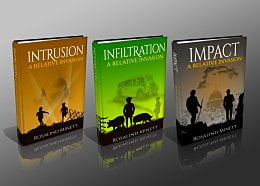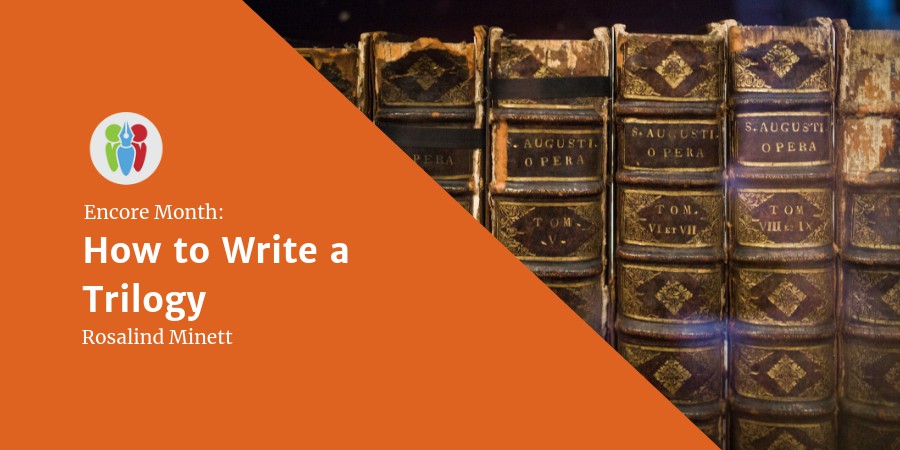
British indie author Rosalind Minett
Today's encore post is all about writing a series, specifically a trilogy. Author member Rosalind Minett discusses how to write a trilogy. She also takes us through the reasons why as an indie author a trilogy really ought to be in your portfolio.
While it’s currently received wisdom that writing books in a series gives the indie author a great marketing advantage, not all series are planned as such – sometimes they evolve from story, as British novelist Rosalind Minett discovered when writing her recently completed Relative Invasion trilogy. Her explanation of how it happened offers useful insights for any writerthinking about producing a series of three of more books.

A Relative Invasion took me far longer to complete than my Ph. did. Am I now a trilogist? No, because I didn't set out to write a trilogy, and ‘trilogist' sounds very iffy, like someone who studies rare flies.
A Relative Invasion is probably the only trilogy I'll write. It was meant as a novel.
Starting Out with One Novel
I began to write the story of a good-hearted boy, Billy, who was going to need all the resilience he could muster to weather the threat of war, and the threat of his manipulative cousin. A trilogy never entered my mind. I wanted to explore how the emotions that led to WWII might play out in micro, in a South London family. This was a story about rivalry.
What Happened Next
This is what happened:
- Billy was only five years old at the start of my story. At around the fifth chapter I knew what the ending must be, and I wrote that in full. I then returned to Chapter Five. Just a matter of getting Billy from that point to the end, but by the time I had written one hundred thousand words, he was still only seven. At that point I stopped, thinking I had better made the story into two books. Backtracking, I wrote a suitable ending to Book One, which came at around seventy-five thousand words.
- When Book Two reached a similar length, World War Two had just ended, but I was a long way from the climax. VE Day provided a natural conclusion. Billy was then twelve, and cousin Kenneth, thirteen. Adolescence and the terrible austerity of London's 1940s lay ahead, together with the fall-out from their life-long rivalry.
- Book Three had to bring the boys to adulthood, and by the time I'd written to that point, I was at one hundred and twenty thousand words. I could have started the boys' careers and made four books, but I had already been describing the previous books as part of ‘a trilogy'. I stuck to this, revised, cut Book 3 down to one hundred and five thousand words. After all, the climax and the ending were just as I'd planned.
Much advice on ALLi and elsewhere suggests that series work best for the indie writer. Is the same true of a trilogy? A trilogy suggests an entity like the three-movement sonata in music, or the triptych in art. The form must be complete, whereas the novelist has more freedom to finish where s/he likes, at any point, at any length.
Crucial Take-Away Points
What can I advise would-be trilogists as result of my labours?
- Early on, write a time-line. Put in the historic events, check exact dates of these. Ensure you record each character's date of birth, location, key events. In a trilogy, you may need to come back to them. Old incidents come back to bite the bottoms of the unwary.
- Write your real ending early on so that you retain a clear sense where your story is going. Ideally, mark out how much will happen in each book.
I'd also suggest the following about a trilogy:
- The story has to be substantial. It has to touch on something in human nature that will resonate meaningfully over the timescale of your three books so that the three do comprise an entity, not three stories about the same people.
- The flow of life needs to show: precursors in Book 1, developments in Book 2, outcomes in Book 3. In music the third part would be recapitulation. Outcomes do have this element: a reworking of earlier events. If there's a crisis in Book 1 it can resolve, but not really conclude there; longer-term effects should pop up in Books 2 or 3.
- There needs to be some sense of linear movement, even if the books are not arranged in chronological sequence. The reader will want to feel the size of the whole time span by the time s/he reaches the end.
- Include several fully-imagined characters. Three books are too many to focus on just one or two main characters. The work needs other characters with their own concerns for the main ones to knock against and react to. The range of possible interactions gives a more detailed picture of the protagonist(s) and a fuller character development.
- Similarly, there needs to be more than one theme. For instance, the main theme in my trilogy is the far-reaching effects of an ongoing childhood relationship. Connected to this is the theme of coming-of-age, bullying, parenting issues, the subtler effects of war service, a re-examining where personal responsibility lies.
- Although the trilogy will follow one arc (mine was before war began until war effects ended – “You've never had it so good”), each book also needs its own arc. Mine fell into line with historic events: threat of war until its onset; the war years; post-war austerity. Each marked great changes in Billy's life.
- It's these changes that make for a satisfying place to end one book and start the next.
Finally, you need to be a sticker; someone with a persistent, resilient personality who does not give up what they have started. I wrote these traits into my main character, and he helped me to stay the course.
OVER TO YOU Do you want to write a trilogy? If you have written a trilogy, do you have any advice you’d like to add to Rosalind’s list? Is three a magic number for a series, or are you pursuing a different plan for your series?
Top tips for writing and #selfpublishing a #trilogy – by @MinettRosalind Share on XOTHER HELPFUL POSTS ABOUT WRITING





If a trilogy has to be stretched out then it becomes like too many others, long winded, endless descriptions of trivial irrelevance along with inane conversations stretching credibility into the banal. I ended up writing one, on the third, by accident in that the ideas kept on coming. What began as a global conspiracy soon changed into other orders of magnitude. Then the plot bifurcated, characters came and went, catastrophes intervened to keep the drama going as things then began once more to spin out of control taking the good down with it. All books have real endings and not just some lame fade out. However it was not until the third that I really hit upon an ending which in the genre I’m writing has not been contemplated. Many ideas are necessary for a single book let alone a trilogy. Many published are about as compelling as the old afternoon soaps. Pity.